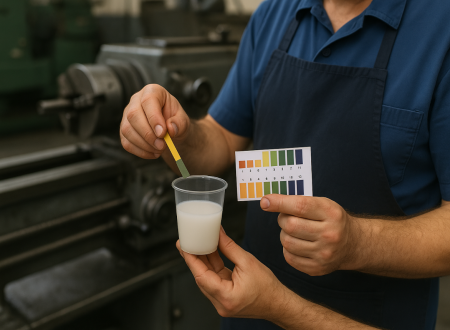
How to Prevent Skin Allergies and Dermatitis from Cutting Oil
Expert Guide to Preventing Skin Allergies in Machining Environments
In metalworking, cutting fluids are essential for precision and tool longevity. However, they can also lead to Occupational Dermatitis - a common yet preventable health risk. Rashes, itching, and skin peeling not only affect operator well-being but also decrease workshop productivity.
As a trusted industrial lubricant supplier, Hai Lu Jya He shares insights from our fluid specialists on the causes of cutting oil allergies and practical ways to prevent them, protecting both your team and productivity.
Understanding the Root Causes of Skin Irritation
Cutting oil dermatitis is rarely caused by a single factor; it is typically the result of a compromised fluid environment. Chemical irritants, such as preservatives and extreme pressure (EP) agents, can be naturally harsh on sensitive skin. This risk is amplified when fluids enter the "pH Danger Zone"—levels above 9.5 strip the skin’s protective oils, while levels below 8.0 allow biological contaminants (bacteria and fungi) to thrive, leading to infections. Furthermore, high-speed machining generates aerosolized mist and carries microscopic metal swarf (fine chips). When these particles settle on the skin, they cause mechanical micro-scratches that allow chemicals to penetrate deeper, accelerating the inflammatory response. Managing these variables is the only way to ensure long-term operator safety and fluid stability.
🔍 3 Root Causes of Cutting Oil Skin Irritation
- Chemical Irritants: Additives like preservatives, emulsifiers, and extreme pressure (EP) agents are necessary for performance but can be harsh on sensitive skin.
- The "pH Danger Zone": * pH > 9.5 (Too Alkaline): Strips natural oils from the skin, leading to dryness and chemical burns.
- Aerosolized Mist: High-speed machining turns fluids into fine airborne particles that settle on exposed skin and irritate the respiratory system.
📒 5 Strategic Solutions for a Safer Workshop
1. Choose Skin-Friendly Fluids: Switch to eco-friendly formulas like our MORESCO or WILL AIE series. These are free from formaldehyde and chlorine, minimizing irritation without sacrificing performance.
2. Maintain the pH "Sweet Spot": Test fluids weekly to keep pH levels between 8.5 and 9.5. Staying in this range prevents both chemical burns (high pH) and bacterial growth (low pH).
3. Optimize Air Quality: Install high-efficiency mist collectors and ensure proper ventilation. This removes invisible airborne particles that irritate the skin and lungs.
4. Use Nitrile Protection: Wear nitrile gloves (not latex) for superior chemical resistance. Always change clothing immediately if it becomes soaked in coolant to avoid prolonged contact.
5. Practice Proper Skin Hygiene: Use mild, pH-neutral cleansers rather than harsh industrial soaps. Apply barrier creams before shifts and moisturizers after work to restore the skin's natural barrier.
☎️ Need Expert Guidance on Fluid Safety? +886-25332210
Don't compromise operator health for performance. Hai Lu Jya He is dedicated to providing proactive, professional advice on safe fluid selection and maintenance. Contact our technical support team today for a fluid safety consultation and solutions tailored to your machinery and environment. Or fill out the form below to connect with a specialist!
- Articles
Foaming in metal machining is a costly and often overlooked issue. When coolant foam affects your CNC lathe or milling machine, it can reduce machining quality, shorten tool life, and destabilize equipment. Based...
Read moreIn machine shops or metalworking facilities, unpleasant odors are a common issue. We often hear complaints about the foul smell.
Read more

